Emilie’s retail shop and tearoom, founded in 2017, spans 2,500 sq. ft., seats 20, and is co-located with Centered Spirit, a cultural and Holistic Center, housing her husband Alex’s holistic medicine practice. Emilie was born in France and grew up in Paris. A graduate of the Sorbonne in business management with post-graduate degrees in marketing. Fluent in Spanish, Emilie was the marketing director for Lacoste in Mexico City. Emilie curates a selection of brands that share the “French Finish,” a style that showcases French expertise in wine, culinary, essential oils, and perfume for more subtle and smoother tasting blends.
Caption: Emilie Jackson in the shop’s classroom where she teaches customers about tea.
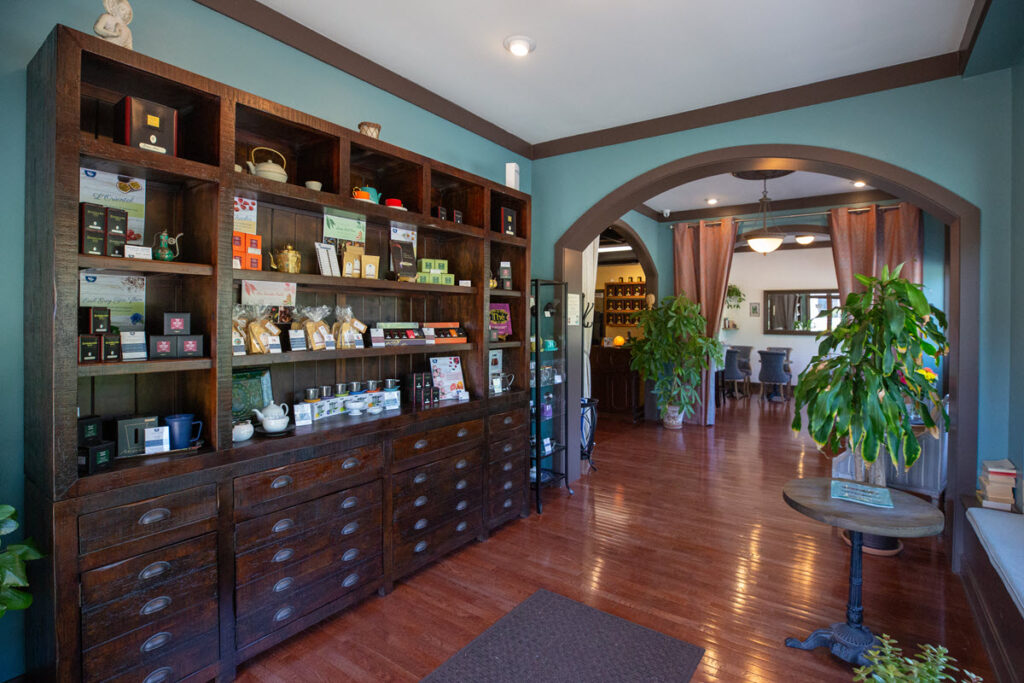
Emilie’s French Teas
By Dan Bolton
Specialty tea retailers in the US and Canada that survived lockdowns are now experiencing a precarious “post-pandemic” “pre-recession” economy marked by steep inflation and rising interest rates. Retailers say that while the pandemic increased demand for better quality tea, in-store traffic has declined as consumers enjoy their tea at home. Home has always been the preferred option for tea drinkers, but before 2020 tea in food service accounted for 20% of global tea revenue. Until office workers return to the world’s cities for daily lunch and afternoon tea breaks the 20% threshold will be difficult for the tea industry to achieve.
See: Foodservice is Recuperating
To attract customers back to their cafes, tea rooms, and shops, retailers seek to make each location a destination. To encourage in-store purchases retailers teach courses in person and via webinars, promote happy hours, host evening entertainment, conduct food pairings and tea tastings, schedule travelogues with demonstrations on tea making, and offering delivery services, curbside pickup, and even drive-thru.
Dan Bolton: How do you describe teas that define French tea culture?
Emilie Jackson: There’s a difference for me between tea cultivation and tea culture. Tea cultivation is where you actually grow the tea. I explain to our customers where tea comes from and how I pick the partners that I work with. I make sure they know it’s fair trade and that the teas have no pesticide or anything like that. It’s one thing common to all the tea we collect from all around the world.
We suggest that for most of our teas customers first drink it without milk or sugar because you’re gonna miss some of the subtleties, right? So, we have real aficionados and some others who don’t know as much about tea. I say to them maybe you don’t like this particular tea, ‘try another’ I say, there’s a tea for everybody.
“What really makes the difference in teas from France is how we finish the blend. We use our wine, culinary, essential oils, and perfume expertise to make the right blend.”
Emilie (Potier) Jackson
What really makes the difference in teas from France is how we finish the blend. We use our wine, culinary, essential oils, and perfume expertise to make the right blend.
France has a long history with wine. When you think about grapes, there are different grapes for different styles of wine. For a long time we were one of the only places who knew how to grow the best wines. Wine makers came to learn and soon there were new regions and new cultivars. Now you get great wines from all over the world. Sometimes in places that you would not even expect. Tea is traveling a similar path. I think tea is experiencing a constant evolution. There’s different regions there’s different soil and climate (and now the impact of climate change) in countries that goes into the tea itself — without even talking about scented tea. You can get some great blends with subtle notes not just because of the terroir but also because of the year it’s been picked. So that’s fascinating and that’s why I like about French style tea blends. When we do a scented tea we never overpower the tea itself you always can taste if it’s a black tea, green, oolong, or white.
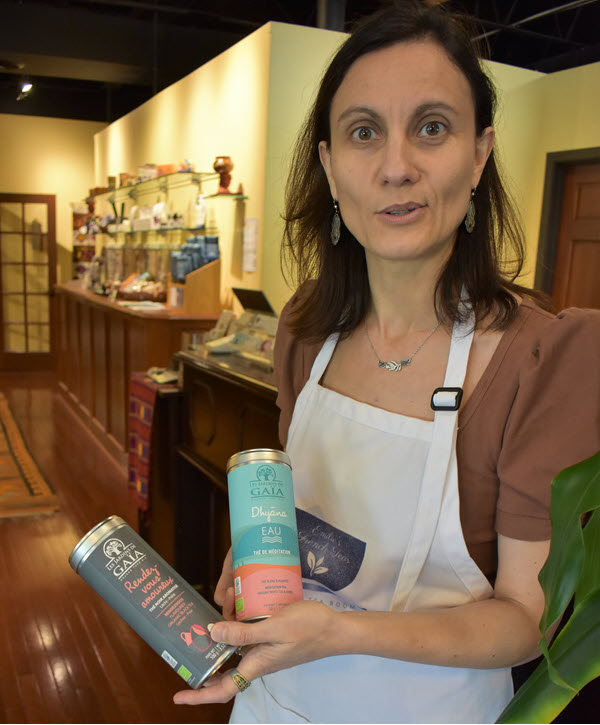
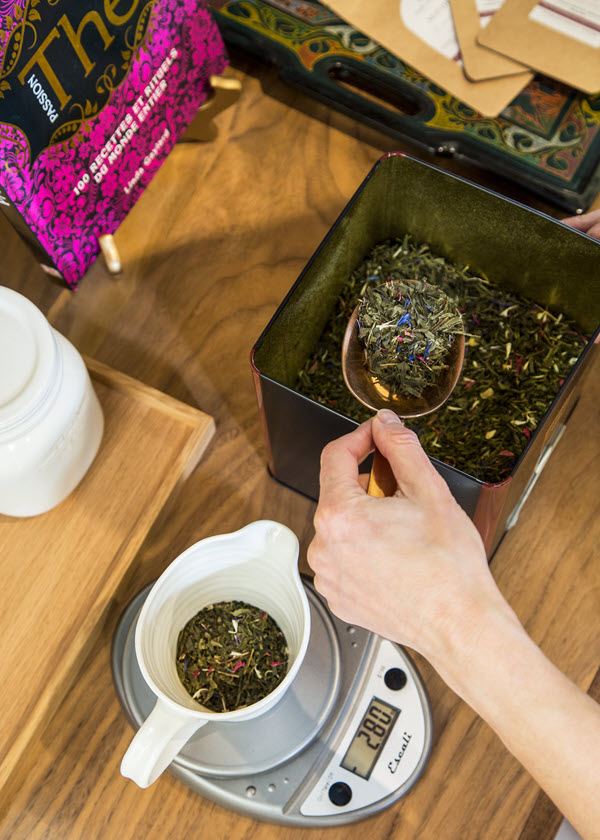
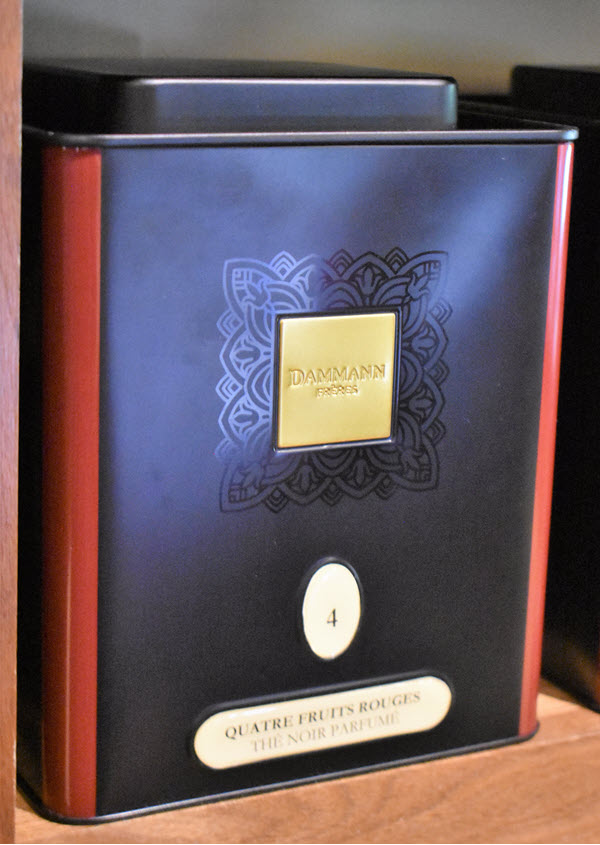
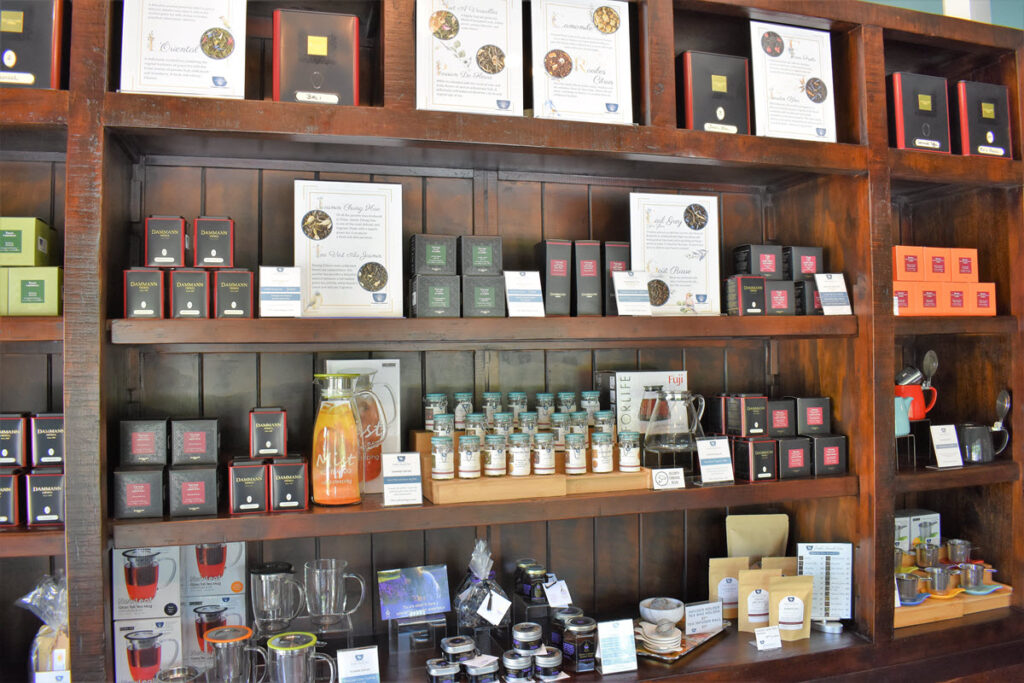
Dan: Do you perceive that your customers are trying to refine their taste in tea and buying more expensive tea? Or do you feel people are beginning to trade down because of inflation and concerns about a recession?
It’s a good question. First of all, for us, we’re already a niche market. We were more, you know, high-end products in the specialty tea category. So the people that come to see us, whether they know our brand, or they’ve been to France, experience some of that here. They come here looking for that. So we’re already more niche. So I think, yes, we’ve probably been impacted by the fear of a recession. And we probably are going to experience a greater impact. I hope people can still find small pleasures that they can buy, like a good loose leaf tea. And that’s one thing about our teas: price ranges are higher, but there are small things you can do for yourself that don’t break the bank.
Dan: Is experiential retail the key to customer retention?
Emilie: I’ve been in the retail business for a long time, and experiential is not new. When we created the shop, it was always about sharing our love of travel and our love for different cultures. You can see that I am from another culture. The photos, decor, and items in the shop are from places we have traveled to and the tea gardens we visited. Experiential retail creates an experience, a universe where people can feel transported.
What I’ve seen before and after COVID is that fewer people are visiting retail shops in general, whether it’s fear of being around people or whether it’s just a change of habit, a lot of people, even the older generation who like to purchase their tea in-store now has learned to do so online. Online shopping has increased. I have people close by who order online and then just pick up the tea. So, in that regard, that’s what has changed.
I have observed that people in the US go out a lot. COVID and everything refocused their attention on home habits. People started during the pandemic to make things at home, including many people who turned to tea because it was comforting. Tea came indoors. So that was good for us so far as packaged sales, but at the same time, making it at home meant fewer trips to the tea room.
So if you look at the tea room itself, of course, that’s going to have an impact, right? So, as far as changing strategy, it’s more about how you deliver your product or put it in the hand of your customers, whether they want that to be in-store or just want to have the product delivered.
I don’t know if it will change my strategy because it’s all about education. And I’ve always wanted to educate people about the different types of tea because there’s so much misinformation out there. Social media has pros and cons. One of the cons of online selling is that there is a lot out there, and the information is not always good. So how, as a consumer, do you find the right information?
Dan: Online sales were a lifeline for many, many smaller tea rooms when they were ordered to close and later as they faced restrictions preventing their previous service level. Your client base stayed loyal, but some appear to have changed their buying habits permanently.
Emilie: First of all, we were kind of, I mean, lucky in some ways; it’s just like when COVID hit, I was just finishing the online store. So, when clients started to ask, Hey, can you, you know, do curbside or anything like that? We were able to do it, you know, it’s a learning curve plus the technology. As far as logistics and everything, people sometimes don’t understand that tea made from Camellia sinensis is mainly grown in Asia, Africa, and India. When it comes to deliveries in the fall and winter, you get even more sales because, in the US, there is a spike when it’s colder. Everybody was ordering online, and all the different services, UPS, DHL, and USPS they didn’t have enough workers.
It’s hard for us because everything else also increased if you think about it, you know, the overhead for just having a brick and mortar shop is very high. People don’t think about that. But that is a lot of the costs incurred, and then shipping has definitely increased. We don’t have the volume in order to decrease the shipping cost when shipping prices go overboard — we’re talking about a quarter or even one-third of the cost of goods. Sometimes when the client is close by, I will deliver it myself.
Dan: Did you pass these costs on to your customers?
Emilie: Well, actually, not that much, not as much as it was suggested I do. But it’s pretty hard, you know, to know at which point the customer can take it.
Dan: Will you discuss the role of retail in educating consumers?
Emilie: It depends on your market, and you know, how you position your brand. I like teaching, it’s my passion, I love learning, so anything that I learn, I always pass it on to the customer.
Most often, I think they enjoy that. Some maybe don’t care, but most like to learn the processes. People are becoming a bit more aware that from the same plant, you get six types of teas. I explain how producers can get a white tea that is aged which makes it even more complicated. I answer many questions about caffeine.
I also compare tea to coffee with people who are more into coffee. They understand the differences between regions and how it affects taste. In the same way, I explain how tea is picked and how that impacts the taste of each tea. At the end of the day, it’s fascinating. That’s what I love about tea you can learn something new every day until you pass away.
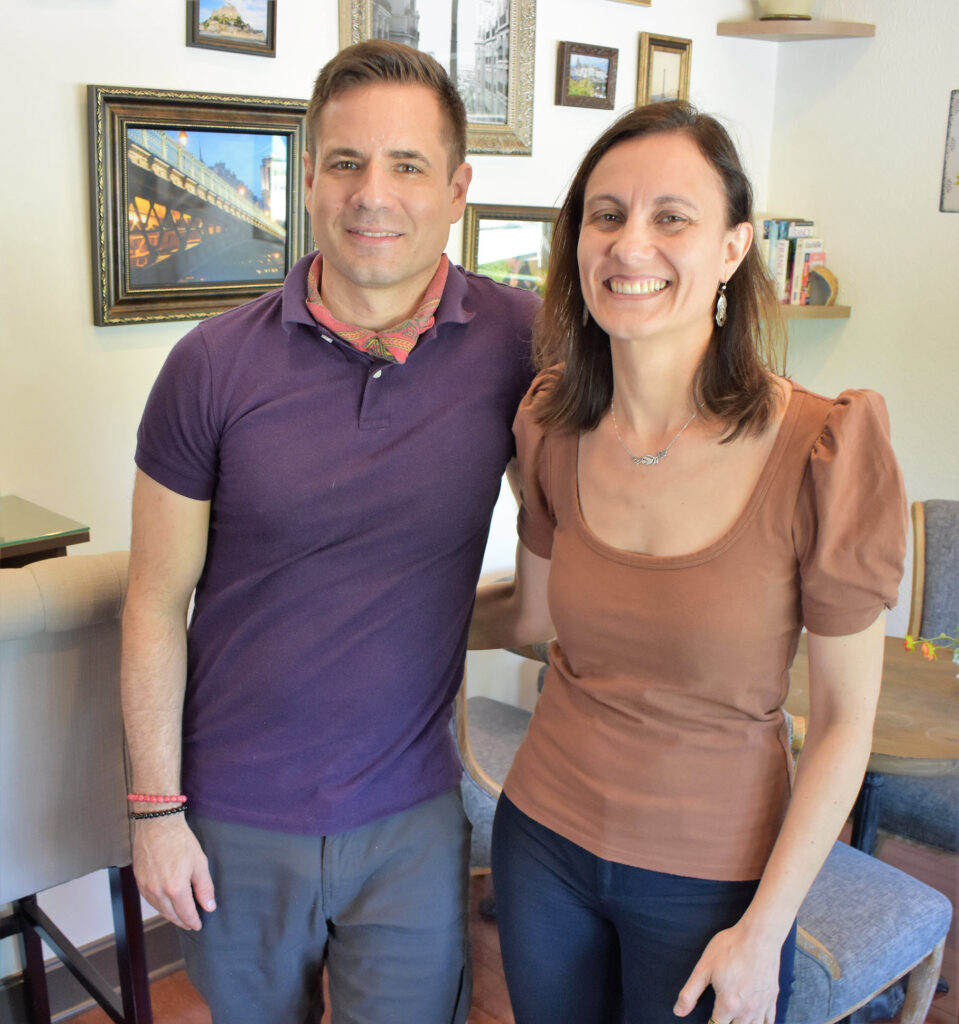
Centered Spirit
The Centered Spirit Cultural and Holistic Center holistic healthcare resource for the local community with several health practitioners that complement each other’s skills along with an apothecary and teaching area.
The Center provides a safe environment for healing, relaxation, and a place to learn about cultures, traditions, and tea rituals around the world. Founders Alex and Emilie Jackson share a passion for the healing traditions of Central America, Mexico, and Europe. Their love for these and other cultures is embedded in every part of the Center, allowing everyone who enters to feel transported, embraced, and at peace.
Share this post with your colleagues.
Signup and receive Tea Biz weekly in your inbox.
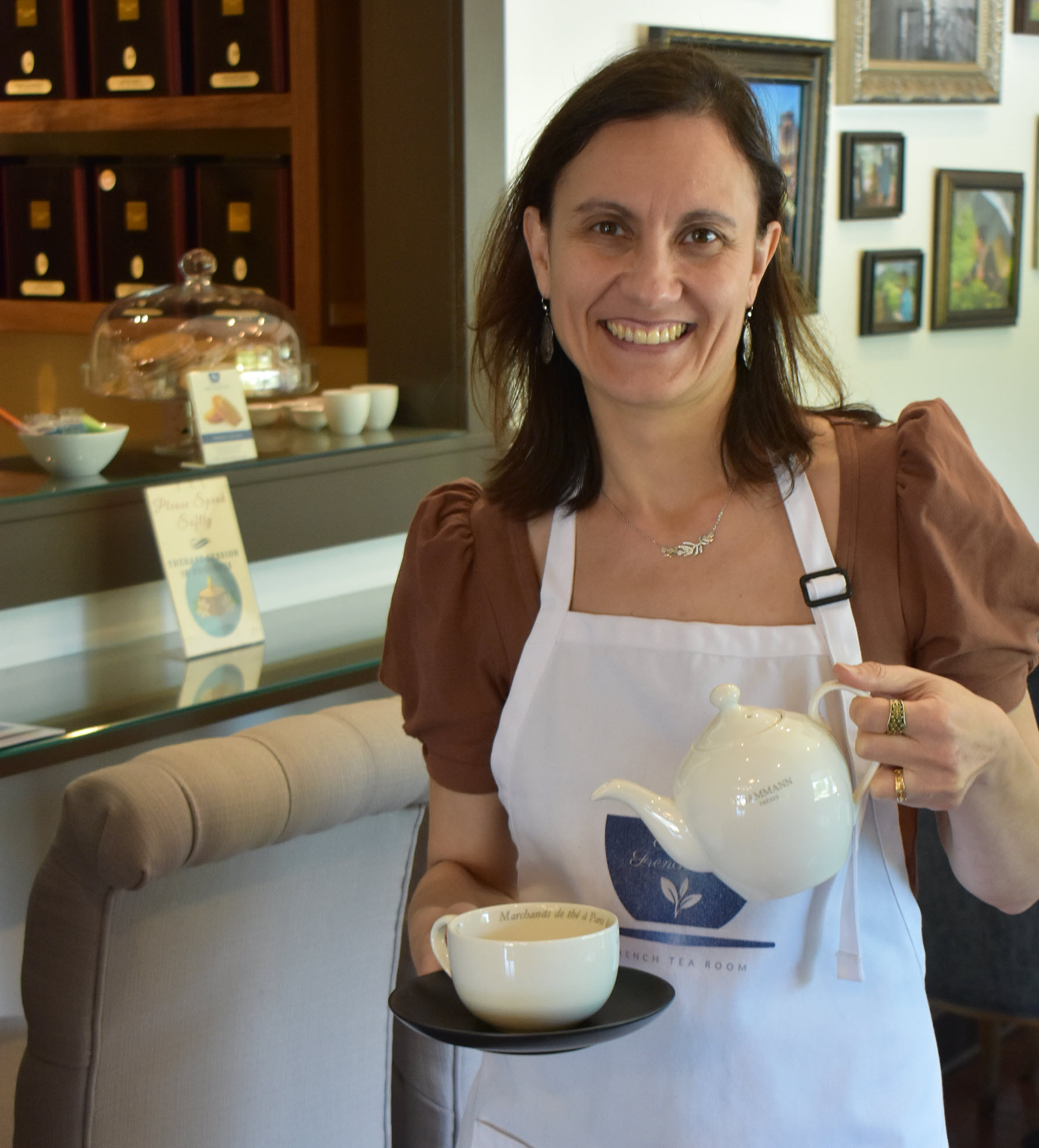
Never miss an episode
Subscribe wherever you enjoy podcasts:

